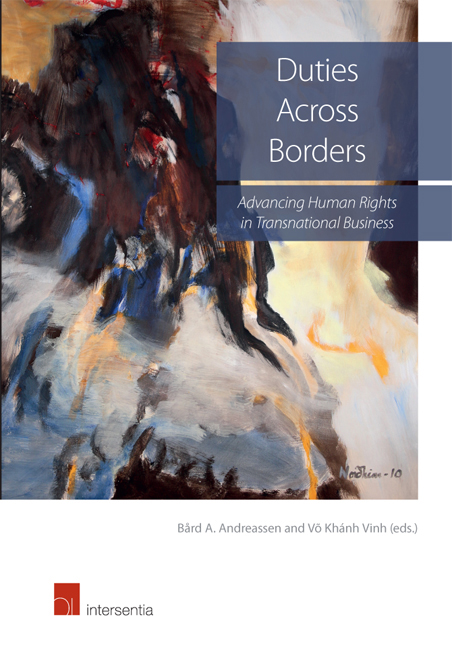Book contents
- Frontmatter
- Preface
- Contents
- List of Authors
- List of Figures and Tables
- Introduction. Business’ Duties Across Borders: The New Human Rights Frontier
- Part I. Conceptual Developments
- Part II Contextual Issues
- Part III Sites Of Regulation
- Chapter 10 Human Rights and Business. An Assessment of the Responsibility of the State in Vietnam
- Chapter 11 Investment Treaties and Human Rights. Reflections from Mining in Latin America
- Chapter 12 Beyond State Duty and Corporate Responsibility. Human Rights in Industrial Zones in Vietnam
- Chapter 13 The Application of the UN ‘Protect, Respect and Remedy’ Framework to State-Owned Enterprises. The Case of the State Oil Company SOCAR in Azerbaijan
Chapter 10 - Human Rights and Business. An Assessment of the Responsibility of the State in Vietnam
from Part III - Sites Of Regulation
Published online by Cambridge University Press: 21 September 2018
- Frontmatter
- Preface
- Contents
- List of Authors
- List of Figures and Tables
- Introduction. Business’ Duties Across Borders: The New Human Rights Frontier
- Part I. Conceptual Developments
- Part II Contextual Issues
- Part III Sites Of Regulation
- Chapter 10 Human Rights and Business. An Assessment of the Responsibility of the State in Vietnam
- Chapter 11 Investment Treaties and Human Rights. Reflections from Mining in Latin America
- Chapter 12 Beyond State Duty and Corporate Responsibility. Human Rights in Industrial Zones in Vietnam
- Chapter 13 The Application of the UN ‘Protect, Respect and Remedy’ Framework to State-Owned Enterprises. The Case of the State Oil Company SOCAR in Azerbaijan
Summary
INTRODUCTION
Human rights are universal in nature, and belong to all people without discrimination. However, the extent to which these rights are realised differs between countries, regions, and sectors, and indeed depends on the willingness and capacity of duty bearers. This chapter examines the role of the state as the key duty bearer to respect, protect, and fulfil human rights responsibilities in the business field in Vietnam.
This chapter argues that human rights norms and standards are not fully integrated in the Vietnamese legal system. In fact, corporate human rights responsibility is not an area of significant interest, and has not been effectively addressed by relevant government institutions and organisations. The main challenges hindering full implementation relate to the gaps in the legislative, administrative, and judicial systems, all of which will be addressed in this chapter.
In order to understand how human rights responsibilities are being promoted and implemented in the business sector in Vietnam, it is important to understand the role of the relevant actors, in particular the leading role of the state. This chapter assesses how the state system in Vietnam is compatible with the UN international standards on human rights and business.
This chapter provides an overview of CSR issues in Vietnam and briefly examines the role of relevant state institutions in addressing corporate human rights responsibility. The chapter than identifies the state's central role in fulfilling human rights obligations by examining existing policies and laws on corporate human rights responsibility. It also examines the legislative, executive, and judicial bodies’ contributions to the creation and enforcement of law and policies related to corporate human rights responsibility. The chapter concludes that, in the context of business in Vietnam, there is still a lack of capacity amongst all relevant state institutions that in effect constrains the respect, protection, and fulfilment of human rights.
CSR AND HUMAN RIGHTS IN VIETNAM: THE ROLE OF RELEVANT PUBLIC INSTITUTIONS
While corporate social responsibility (CSR) has been discussed globally for decades, it is a relatively new concept in Vietnam. CSR was first introduced to Vietnam in the mid-1990s, when TNCs invested in local factory facilities (initially in the footwear and garment industries) and implemented their own codes of conduct or labour standards.
Since then, CSR has gained attention from a variety of actors, including corporations, international organisations and government and non-governments institutions.
- Type
- Chapter
- Information
- Duties Across BordersAdvancing Human Rights in Transnational Business, pp. 227 - 252Publisher: IntersentiaPrint publication year: 2016

